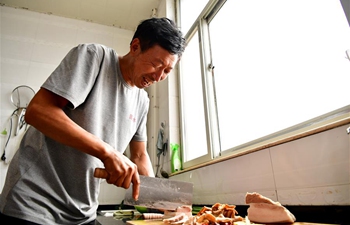UNITED NATIONS, Aug. 3 (Xinhua) -- In promoting World Breastfeeding Week, the UN Children's Fund (UNICEF) has called for greater investment in paid parental leave and support facilities in workplaces.
World Breastfeeding Week is marked annually on Aug. 1-7 to highlight the critical importance of breastfeeding for children across the globe.
At its start, UNICEF Executive Director Henrietta Fore said: "The health, social and economic benefits of breastfeeding -- for mother and child -- are well-established and accepted throughout the world. Yet, nearly 60 percent of the world's infants are missing out on the recommended six months of exclusive breastfeeding."
Increasing breastfeeding could prevent 823,000 annual deaths in children under five and 20,000 annual deaths from breast cancer, according to UNICEF.
In spite of the benefits of breastfeeding, Fore said, workplaces worldwide are denying mothers much needed support.
Far greater investment is needed in paid parental leave and breastfeeding support across all workplaces to increase breastfeeding rates globally, she urged.
In observance of the week, UNICEF published a fact sheet on breastfeeding, which shows some worrying trends.
Only 41 percent of babies were exclusively breastfed in the first six months of life in 2018. In comparison, these rates were more than half -- 50.8 percent -- in the least developed countries, with highest rates found in Rwanda (86.9 percent).
Upper-middle-income countries have the lowest breastfeeding rates. In upper-middle-income countries, exclusive breastfeeding rates were the lowest at 23.9 percent, having decreased from 28.7 percent in 2012.
Worldwide, only 40 percent of women with newborns have even the most basic maternity benefits at their workplace. This disparity widens among countries in Africa, where only 15 percent of women with newborns have any benefits at all to support the continuation of breastfeeding.
The International Labour Organization's maternity protection standards include at least 14 weeks of paid maternity leave, and countries are recommended to provide at least 18 weeks as well as workplace support for breastfeeding families. Yet, only 12 percent of countries worldwide provide adequate paid maternity leave.

















